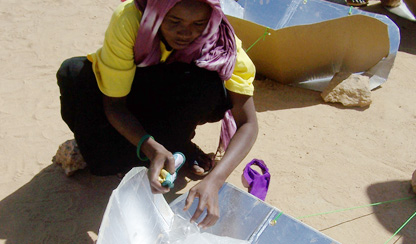The Simple Tool That Saves Women’s Lives
By Dr. Ranit Mishori
published: 03/01/2009

A woman at the Iridimi camp in Chad boils water in a solar cooker (photo courtesy of Jewish World Watch)
A cardboard box is saving the lives of thousands of people in Africa. It’s called a solar cooker, and it is pure ingenuity. Take two pieces of cardboard, add some tinfoil and sunlight””and anything can be cooked. You can even get water to boil.
With the help of thousands of Americans, solar cookers have found their way to camps in Chad that house refugees who fled the genocide in Darfur, Sudan. More than 250,000 live in these camps, each sheltering about 20,000 people.
The cookers have made a huge difference””and not just because they are a way to heat food. Without them, refugee women must go outside the camp to gather firewood. But to leave camp is to gamble with death. Women and children””especially girls””are “particularly vulnerable to attack and rape when they are out getting wood,” says Rachel Andres, director of the Solar Cooker Project at Jewish World Watch. The equation is simple, she says. A solar cooker keeps you in camp, and that helps keep you alive.
The numbers back this up. A recent survey at one refugee camp showed that journeys to collect firewood outside the camps dropped by 86% after the solar cookers were made available.
Women are taught not only how to use the cookers but also to make them. Suddenly, they have “ a new skill and an opportunity to generate income for their families,” explains Andres. For Eklass, a Sudanese refugee at the Iridimi camp, the income earned from assembling the cookers “ allows me to buy bread, milk, and clothes for my family,” she says. “Without this job, my children wouldn’t have what they need.”
Indeed, calculating all the pluses, you can really think of this cardboard construction as the Little Cooker That Could. About 20 women in each camp involved hand-assemble the simple cookers in workshops. More than 40 women have been trained to teach others how to use them. After instruction, refugee families receive two kits: one to cook millet and one for an accompanying vegetable or sauce. Each cooker lasts about six to nine months.
The cookers need to be placed in a sunny spot outdoors, in an area protected from wind. The plentiful sunlight is converted into heat energy, which is then used for cooking. (Cookers do not work at night or on cloudy days.) Food prepared with a solar cooker takes longer to cook compared with an oven or fire, but it also requires less hands-on time.
Having solar cookers gives the women more time to do other things””look after their children, visit friends, tend to household chores, and especially take care of themselves. Some women say they are able to use the time saved to learn new things, such as reading, knitting, and basket-making.
The project has health benefits too. The cookers allow women to boil water””which kills off water-borne disease-causing microbes. They also replace the wood and kerosene stoves that produce unhealthy smoke and use scarce and expensive fuels. Solar cooking is cleaner, safer, and almost always ready to go.
Each cooker costs about $15. Jewish World Watch has donated more than 40,000 solar cookers to the Iridimi, Touloum, and Oure Cassoni refugee camps in Chad. The health and environmental benefits also have made the cookers attractive alternatives in other distressed areas in the world. In addition to Darfur, humanitarian projects have introduced solar cookers to Mali, Kenya, and Tanzania in Africa, and to India, Vietnam, and Nepal in Asia. To date, more than $1.6 million has been raised for the purchase of solar cookers by some 300 organizations, churches, and synagogues across the United States.
With more than a million solar cookers distributed so far, according to Solar Cookers International, it’s easy to see that there really are times when low-tech can be high-impact.
To participate in the distribution of solar cookers to refugees of Darfur and others, visit solarcookerproject.org

